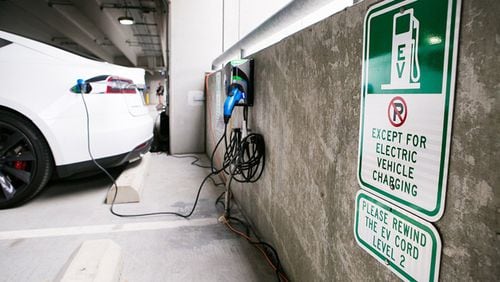The Atlanta City Council recently passed ordinance 17-0-1654, which will require all new residential homes and public parking facilities to accommodate electric vehicles. The ordinance requires 20 percent of the spaces in all new commercial and multifamily parking structures be EV ready. It also requires that all new development of residential homes be equipped with the infrastructure needed to install EV charging stations, such as conduit, wiring and electrical capacity.
“EVs have zero tailpipe emissions,” says Stephanie Stuckey, Atlanta’s Chief Resilience Officer. “While our air quality is improving, we still need to be mindful of our ozone and particulate pollution, such as, nitrogen oxides. Atlanta is committed to a clean, healthy environment for our residents and visitors, especially our most vulnerable populations. Transitioning to alternative forms of fuel and transportation is critical to this commitment.”
Through a public-private partnership, the city of Atlanta deployed 60 electric vehicles, along with the corresponding infrastructure charging network, to the city’s fleet inventory last year. This program currently serves as one of the largest municipal fleets of electric vehicles in the United States and will ultimately reduce the city’s dependence on fossil fuels while saving taxpayers thousands of dollars per year. In addition, the electric vehicle fleet program is aligned with the city’s Power to Change Plan which seeks to reduce vehicle emissions by 20 percent by the year 2020.
The City of Atlanta also deployed five neighborhood electric vehicles for the Atlanta Police Department PATH Force Unit, the Atlanta Fire Rescue Department and the Department of Parks and Recreation to access the Atlanta BeltLine with zero emissions in June 2016.
The City’s other notable accomplishments in promoting clean technologies include Atlanta’s recent commitment to transition to 100 percent clean energy sources for municipal operations by 2025 and for the entire city by 2035, contracting $160 million in energy efficiency retrofits in municipal buildings and participation in the U.S. Department of Energy’s Better Buildings Challenge program with 114 million square feet of building space committed to reducing their energy and water consumption by at least 20 percent by 2020.






